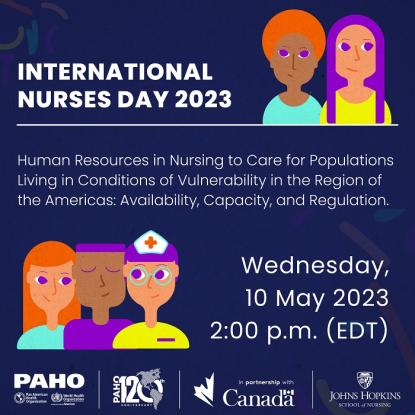
As part of International Nurses Day celebrations, the Pan American Health Organization (PAHO) invites Member States to a debate on the availability, capacity, labor market, and regulation of qualified nurses to expand access to primary healthcare services and health coverage to the populations of the Region of the Americas, especially those living in conditions of vulnerability.
As the world begins to emerge from a pandemic that has affected the lives and livelihoods of hundreds of millions of people in the Americas, there is a crucial need to transform health systems by building on primary care, focusing on people and communities, increasing their resilience, and accelerating progress towards achieving universal access to health and universal coverage, and in achieving the Sustainable Development Goals (SDG).
Human resources for health enable health systems and services to respond to the population's health needs. A well-trained, skilled, and equitably distributed workforce is critical to building resilient health systems, meeting population health needs, better preparing against future threats and pandemics, and addressing workforce availability, capacity, competence, and quality gaps.
PAHO, through the policy brief "The Strategic Importance of National Investment in Nursing Professionals in the Region of the Americas," and in line with the "Global strategic directions for Nursing and Midwifery 2021–2025," calls on Member States to consider the importance of investing in nursing education, jobs, leadership, and service. [1, 2]
These professionals are crucial in health care system services, health promotion, disease prevention, health management teams, and education institutions.
However, recent estimates on the availability and density thresholds required to meet the SDG 3.8.1 target for human resources for health showed that Latin American and Caribbean countries had a nurse density of 44.3 (34.5–55.9) per 10 000 population. To reach the high aspirational target of 80% on the UHC adequate coverage index, at least 70.6 nurses and midwives per 10 000 population would be required. [3]
If the personnel deficit is corrected, nurses can be vital to building resilient health systems and moving towards more significant health equity with actions and roles that protect migrants, people living in poverty, informal sector workers (most of whom are women), those with precarious working conditions or who live in overcrowded housing, and other groups in situations of vulnerability.
International Nurses Day activities aim to foster discussions and share knowledge and actions to advance nursing professionals' access, availability, and quality in the Americas region.
______
[1] Pan American Health Organization. (2022). "The Strategic Importance of National Investment in Nursing Professionals in the Region of the Americas" PAHO. https://iris.paho.org/handle/10665.2/55957
[2] World Health Organization. (2021) Global strategic directions for nursing and midwifery 2021-2025 WHO. https://apps.who.int/iris/handle/10665/344562
[3] Pan American Health Organization. (2022). Building Resilient Health Systems to Advance toward Universal Health in the Americas: Lessons from COVID-19 https://iris.paho.org/handle/10665.2/56444
International Health Days Events Nursing Health Systems and Services Canada
To foster debate on the capacity, availability, and distribution of qualified nurses to expand access and health coverage to primary health care services, especially for populations living in conditions of vulnerability.
Expanding the availability of nursing professionals and the role of nurses in populations living in conditions of vulnerability
- Availability and capacity of nurses to care for populations living in conditions of vulnerability
- Nursing Education and Development
- The role of nurses in populations living in conditions of vulnerability in primary health care
Challenges in training and ensuring decent work for nurses in the post-pandemic period
Moderator: Silvia Cassiani, Advisor on Nursing and Health Technicians, PAHO/WHO
Jarbas Barbosa, Director, PAHO/WHO
Sarah Szanton, Dean, Johns Hopkins University School of Nursing
Bruno Guimarães, Director of the Department of Health Work Management and Regulation, Ministry of Health, Brazil
Gabriel Muntaabski, National Coordinator of the National Nursing Education Program, Ministry of Education, Argentina
Valentina Jaimes Vargas, Nurse of Primary Health Care Service, Colombia
Nancy Reynolds, Professor and Associate Dean of Global Affairs, Johns Hopkins University School of Nursing
Tzvetomira Radoslavova, Occupational Safety and Health Specialist, International Labour Organization (ILO)
